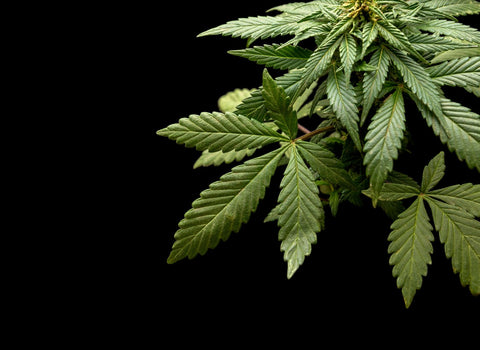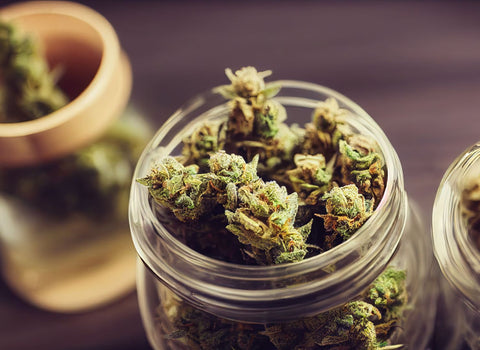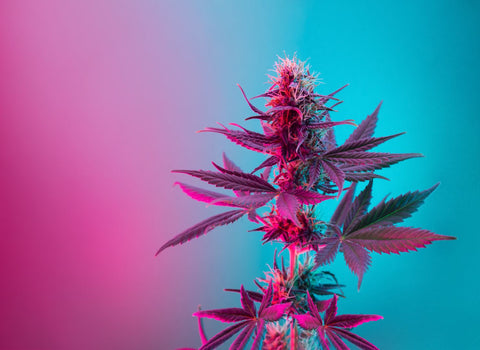
Tired of OCD and anxiety controlling your life? Low doses of cannabis may help. A 2021 study showed that cannabis “reported a 60% reduction in compulsions, a 49% reduction in intrusions, and a 52% reduction in anxiety.”
We got curious whether some strains are better than others for reducing anxiety and easing the symptoms of obsessive-compulsive disorder (OCD). Here’s what the science says: low-THC, high-CBD strains—especially hybrids and indicas—are the most effective.
That’s why we’ve crafted our Relax Plus Gummies with only 5mg of Delta 9 THC and 25mg of CBD. This combination alleviates the symptoms of OCD and anxiety and offers gentle and effective relief.
Whether you’re looking for a pick-me-up, relaxation, or bliss, you’ll find your perfect gummy in our collection of organic, all-natural edibles.
What is OCD?
Obsessive-compulsive disorder is a chronic mental health condition where people have uncontrollable, recurring thoughts (obsessions) that drive them to do repetitive behaviors (compulsions). These thoughts and actions can seriously disrupt daily life, causing significant distress. While OCD symptoms may fluctuate, they often persist and worsen over time if left untreated.
Symptoms of OCD
People with OCD often struggle to:
- Control intrusive, unwanted thoughts that cause intense anxiety (e.g., fears of contamination, losing control, making mistakes, or taboo ideas related to sex or religion).
- Resist the urge to perform repetitive, ritualized behaviors to temporarily alleviate anxiety caused by obsessions.
- Manage the significant distress and interference OCD can have on their daily life, as these symptoms can consume a lot of time each day.
- Overcome the senselessness of their obsessions and compulsions, despite recognizing their irrationality.
- Cope with co-occurring conditions such as tic disorders, anxiety, depression, post-traumatic stress disorder (PTSD), or substance abuse, which can develop alongside OCD.
Anxiety is a core feature of OCD, as the obsessions that characterize the disorder cause significant anxiety and distress.
OCD and anxiety
People with OCD feel compelled to do certain actions (compulsions) to ease the anxiety caused by their intrusive thoughts (obsessions). OCD is a type of anxiety disorder, but is unique because it involves both obsessions and compulsions.
Here's how OCD relates to anxiety:
- Obsessions trigger anxiety—the intrusive, unwanted thoughts that define obsessions in OCD cause intense feelings of anxiety, fear, or discomfort.
- Compulsions aim to reduce anxiety—people with OCD perform repetitive behaviors or mental acts (compulsions) to temporarily relieve the anxiety caused by their obsessions.
- Anxiety reinforces the OCD cycle—the temporary relief from anxiety that compulsions provide reinforces the OCD cycle. People learn to rely on these ritualized behaviors to cope with their distress.
- Other anxiety disorders are common—many people with OCD also struggle with other anxiety disorders, such as generalized anxiety disorder (GAD), social anxiety disorder, or panic disorder.
OCD and anxiety disorders are often treated using similar approaches, such as cognitive-behavioral therapy (CBT) and exposure and response prevention (ERP) therapy. Many people rely on medication, such as selective serotonin reuptake inhibitors (SSRIs), to manage their symptoms.
We have a safe and natural solution to alleviate anxiety and soothe OCD: microdosing cannabis. Small, controlled doses of THC and CBD may reduce anxiety levels and the intensity of obsessive thoughts without the risk of side effects associated with traditional medications.
How cannabis impacts anxiety and OCD
Microdosing cannabis can alleviate the symptoms of OCD without causing impairment. When you take cannabis microdoses (between 2 and 10 milligrams of Delta 9 THC per serving), cannabis compounds interact with your brain systems differently than higher doses, gently easing anxiety and repetitive urges.
A 2021 study reported that treatment with cannabis-based medicines has shown promising results in reducing OCD symptoms and improving the quality of life in some patients with treatment-resistant OCD.
Based on this and other scientific and anecdotal evidence, cannabis microdosing may:
- Quiet obsessive thoughts and intrusive thinking patterns
- Lessen compulsive behaviors and mental ritualizing
- Reduce anxiety and distress around specific OCD triggers
- Alleviate depression that often accompanies chronic OCD
- Enhance sleep quality for those kept awake by repetitive thoughts
- Improve daily functioning, concentration, and quality of life
Mexican researchers found that the combination of cannabidiol (CBD) and THC at balanced ratios temporarily reduced OCD symptoms such as anxiety, compulsions, and intrusive thoughts.
Mauzay, et. al. found that “patients [in their study] reported a 60% reduction in compulsions, a 49% reduction in intrusions, and a 52% reduction in anxiety from before to after inhaling cannabis. Higher concentrations of CBD and higher doses predicted larger reductions in compulsions.”
These studies suggest that balanced CBD and THC ratios and higher CBD concentrations may be most effective for reducing OCD symptoms and anxiety. This raises an interesting question: which cannabis strain is better suited for managing these conditions?
We’re not surprised that cannabis can alleviate anxiety. We’re well aware of the therapeutic benefits of microdosing cannabis, especially when it comes to mental health. When you stick to lower amounts (between 2 and 10 mg of THC in our edibles), you avoid the overwhelming high that can come from higher doses.
Try our Bliss Delta 9 gummies with only 5 mg of THC and 5 mg of CBD per edible. They give you the perfect balance of relaxation and relief packed in delicious, fruit-filled gummies.
"I only bite off 1/4 of one and it's enough to take the edge off without feeling too "blissful." They taste good and arrive on time."
Is sativa or indica better for anxiety and OCD?
Indica strains are generally better than sativas (sativa and indica being the two primary categories of weed strains) at modulating OCD tendencies. Indicas tend to be more relaxing, while sativas are more heady.
Hybrid strains—especially those with high CBD and low THC—are also good.
A perfectly balanced edible for OCD should contain lower amounts of THC and higher levels of CBD. Our Relax Plus gummies offer just that—only five milligrams of THC accompanied by 25 milligrams of CBD. These delicious watermelon-flavored edibles allow you to unwind and let go of intrusive thoughts without the psychoactive effects of higher THC doses.
The best strains for anxiety
If you want to relieve anxiety, look for strains high in CBD. Cannabidiol is a non-intoxicating cannabinoid and can promote relaxation and sleep even at smaller doses. Low-THC and high-CBD strains are an excellent choice for quieting the constant chatter of worry in your mind.
Here are five hybrid strains known for their anxiety-relieving properties:
- Harlequin: this hybrid has a CBD and THC ratio of around 5:2, offering a clear-headed, relaxing experience that'll melt away your worries without leaving you feeling out of sorts.
- Cannatonic: another high-CBD hybrid perfect for when you need to take the edge off stress and anxiety while still keeping your mental gears turning smoothly.
- ACDC: if you want to kick anxiety to the curb without the intoxicating effects of THC, this sativa-dominant strain boasts an impressive 20:1 CBD to THC ratio.
- Granddaddy Purple: this indica-dominant hybrid is famous for its deep, full-body relaxation and stress-busting effects, perfect for when you need to calm both mind and muscle.
- Northern Lights: its euphoric and deeply relaxing effects can help quiet even the most persistent anxious thoughts, allowing you to bask in peace and a sense of calm.
These strains can be consumed in different forms: smoking, vaping, or tinctures. The best way to consume cannabis, regardless of the strain and purpose, is with edibles such as THC drinks and gummies. Edibles provide a slower, more gradual onset of effects, allowing you to better control your dosage and avoid lung irritation associated with smoking or vaping. They are a discreet and convenient option for managing anxiety symptoms throughout the day.
Product QUIZ
Need help deciding what product is best for you? Take our quiz, just three questions until your perfect match!
The best strains for OCD
High-CBD strains ease symptoms of OCD. Some of the same cannabis strains that reduce anxiety also soothe OCD symptoms.
Here are five strains known for their potential to alleviate OCD symptoms:
- Cannatonic: thanks to its ability to soothe anxiety, reduce stress, and promote mental clarity, this high-CBD hybrid is a go-to for many people with anxiety and OCD.
- Harlequin: this beneficial strain for anxiety can also soothe your OCD symptoms. Harlequin offers a mellow, clear-headed experience that can help quiet obsessive thoughts and ease compulsive behaviors.
- ACDC: this cannabis strain is a top choice for those seeking to manage OCD symptoms.
- Sour Tsunami: this sativa-dominant hybrid combines the mood-boosting and focus-enhancing qualities of sativas with the relaxing and anxiety-reducing properties of indicas—a winning combination for many people with OCD.
- Ringo's Gift: a high-CBD hybrid that can help ease anxiety, stress, and intrusive thoughts.
If you’re unsure about which strain to choose to soothe your anxiety and OCD, try our Energy gummies with only 2.5 mg of THC per edible and 5 mg of CBD. This balanced ratio is ideal for managing OCD symptoms, as the CBD helps take the edge off anxiety and quiets obsessive thoughts, while the low dose of THC provides a subtle lift in mood and energy.
The worst strains for anxiety and OCD
Some cannabis strains can do more harm to your OCD and anxiety than good. High-THC sativas are often the worst offenders, as they can intensify racing thoughts, exacerbate anxiety, and trigger paranoia.
These strains have cerebral, racy effects that can send the mind of someone with OCD spiraling into a maze of obsessive thoughts and compulsive behaviors—which is exactly what they want to avoid. Instead of finding relief, users may feel trapped in a heightened state of anxiety, unable to escape the clutches of their most intrusive thoughts and fears.
If you're looking for a cannabis product that won't send your OCD and anxiety into overdrive, look no further than nama's™ balanced hybrid edibles. We carefully craft blends of sativa and indica strains, combined with high levels of CBD, to bring out the soothing effects without the overwhelming euphoric effects. We want to quiet your intrusive thoughts and ease compulsive behaviors, not make things worse.
All our edibles contain ultra-low doses of THC, so there is virtually no danger of any adverse effects when consumed responsibly.
Did you hear about our collection of mouth-watering buzztails™? These THC-infused soft drinks are guaranteed to quench your thirst and replace alcohol in all your favorite drinks—no unwanted side effects.
Infuse your favorite mocktails, lemonades, and juice blends with our cannabis liquid Buzz drops™.
Where to buy the best gummies for anxiety and OCD
Are you looking to buy the best THC edibles on the market to help quiet the relentless storm of intrusive thoughts? Skip the corner stores, shady brands, and sketchy products that provide no third-party lab tests and no guarantee that their products are safe and effective. You can purchase edibles from nama™.
We offer safe, third-party tested, quality Delta 9 edibles to curb the symptoms of OCD and soothe anxiety. Our edibles are organic, lab-tested for purity and potency, and expertly dosed from premium American hemp. Since they contain cannabis compounds derived from hemp, all of our THC edibles are federally legal in the US.
Read more about the legality of Delta 9 THC.
OCD and anxiety FAQ
How do you calm OCD anxiety?
To calm OCD anxiety, you can try several techniques, such as deep breathing exercises, mindfulness meditation, or relaxing activities like yoga or taking a warm bath. Certain cannabis strains with anxiolytic effects may also help reduce many symptoms of anxiety.
What is the best support for OCD?
The best support for OCD typically involves a combination of therapy, such as cognitive-behavioral therapy (CBT) or exposure and response prevention (ERP), and medication, such as selective serotonin reuptake inhibitors (SSRIs). Some people may also find relief from their symptoms by using specific medical marijuana strains under the guidance of a licensed physician. Strains with balanced THC and CBD levels may have potential benefits for OCD.
Do anxiety and OCD go together?
Anxiety and OCD often go together. Many people with OCD experience excessive worry and anxiety as part of their mental health disorder. The intrusive thoughts and compulsive behaviors characteristic of OCD can lead to heightened stress levels and feelings of anxiety. For many people, the OCD and anxiety symptoms overlap, making it harder to diagnose whether a person has anxiety or an obsessive-compulsive disorder.
Does caffeine make OCD worse?
Caffeine can potentially make OCD worse for some people. As a stimulant, caffeine can increase heart rate and contribute to feelings of anxiety, which may make OCD symptoms worse. These effects of caffeine on OCD are different from person to person and depend on many factors such as individual tolerance and body chemistry.
Does OCD ever go away?
OCD is a chronic mental health condition that often requires ongoing management. While symptoms may improve with treatment, such as therapy and medication, OCD typically does not go away entirely. For some people, OCD symptoms can reduce significantly over time to the point where they no longer meet the diagnostic criteria for the disorder. Others may require ongoing treatment to maintain their mental health and keep their symptoms under control.
Does OCD get worse with age?
OCD can potentially get worse with age if left untreated. As stress levels and life changes accumulate over time, OCD symptoms may intensify. With appropriate treatment and coping strategies, people can effectively manage their OCD symptoms throughout their lives.
Is OCD a form of autism?
OCD is not a form of autism. While both conditions are neurodevelopmental disorders, they are distinct mental health issues with different diagnostic criteria. Some autistic people may also experience OCD-like symptoms or have a co-occurring OCD diagnosis.
Resources
Szejko, N., Fremer, C., & Müller-Vahl, K. R. (2020). Cannabis Improves Obsessive-Compulsive Disorder—Case Report and Review of the Literature. Frontiers in Psychiatry, 11. https://doi.org/10.3389/fpsyt.2020.00681
Nicolini, H., Martínez‐Magaña, J. J., Genis‐Mendoza, A. D., Velázquez, J. A. V., Camarena, B., Fleiz, C., Bustos-Gamiño, M., García, A. A., Lanzagorta, N., & Medina‐Mora, M. E. (2021, May 10). Cannabis Use in People With Obsessive-Compulsive Symptomatology: Results From a Mexican Epidemiological Sample. Frontiers in Psychiatry. https://doi.org/10.3389/fpsyt.2021.664228
Mauzay D, LaFrance EM, Cuttler C. Acute Effects of Cannabis on Symptoms of Obsessive-Compulsive Disorder. J Affect Disord. 2021 Jan 15;279:158-163. doi: 10.1016/j.jad.2020.09.124. Epub 2020 Oct 6. PMID: 33049434.
nama CBD FDA & legal disclaimer
Our products are not intended to diagnose, treat, cure, or prevent any disease. They are not a replacement for prescription medications and have not been evaluated by the Food and Drug Administration (FDA).
The information provided on this website does not and is not intended to, constitute legal advice or any statements of the status of any laws. Any information, content, and materials available on this site are for general informational purposes only and are not intended to be relied upon for any purpose.
Readers of this website should contact their attorney to obtain advice concerning any particular legal matter including decisions on what products are, or are not, legal to sell, possess, or consume. No reader, user, or browser of this site should act or refrain from acting based on information on this site without first seeking legal advice from their own counsel in the relevant jurisdiction.
Only your individual attorney can provide assurances that the information contained herein – and your interpretation of it – is applicable or accurate for your particular situation. Use of, and access to, this website or any of the links or resources contained within the site do not create an attorney-client relationship between the reader, user, or browser, and website authors, contributors, contributing law firms, or committee members and their respective employers.
More articles
About
Learn
Join us on this journey

© Copyright 2025 nama Products LLC. All Rights Reserved.
†These statements have not been evaluated by the Food and Drug Administration. These products are not intended to diagnose, treat, cure or prevent any disease. All information presented here is not meant as a substitute for or alternative to information from health care practitioners. Please consult your health care professional about potential interactions or other possible complications before using any product.
††The information provided on this website does not, and is not intended to, constitute legal advice or any statements of the status of any laws. Any information, content, and materials available on this site are for general entertainment purposes only, and are not intended to be relied upon for any purpose.
123 John Doe Street
Your Town, YT 12345
Store Hours
Sun: Closed
Mon-Fri: 9:00 - 17:00
Sat: 10:00 - 13:00
What to expect at pickup
Closed
Closing at 5pm
Closing at 5pm
Closing at 5pm
Closing at 5pm
Closing at 5pm
Closing at 1pm



![Euphoria Black Raspberry [10ct]](http://www.namacbd.com/cdn/shop/files/nama_black_raspberry_pouch.png?v=1715285306&width=480)
![Euphoria Black Raspberry [10ct]](http://www.namacbd.com/cdn/shop/files/nama_black_raspberry_nutrition_label.png?v=1715285313&width=480)
![Euphoria Kiwi Raspberry [10ct]](http://www.namacbd.com/cdn/shop/files/nama_kiwi_raspberry_pouch.png?v=1715285056&width=480)
![Euphoria Kiwi Raspberry [10ct]](http://www.namacbd.com/cdn/shop/files/nama_euphoria_kiwiraspberry_nutrition_facts.jpg?v=1715873960&width=480)
![Euphoria Triple Berry [10ct]](http://www.namacbd.com/cdn/shop/files/nama_euphoria_triple_berry_pouch.png?v=1715286095&width=480)
![Euphoria Triple Berry [10ct]](http://www.namacbd.com/cdn/shop/files/nama_euphoria_tripleberry_nutrition_facts.jpg?v=1715873950&width=480)


![Buzz Drops™ [THC Drink Drops]](http://www.namacbd.com/cdn/shop/files/nama_thc_buzz_drops.png?v=1711412866&width=480)
![Buzz Drops™ [THC Drink Drops]](http://www.namacbd.com/cdn/shop/files/buzz-drop-wine-comparison.png?v=1736882023&width=480)
![Buzz Packs™ [THC and CBD Powder Drink Mix]](http://www.namacbd.com/cdn/shop/files/nama_buzz_packs_thc_drink_pack_white_background.png?v=1741884660&width=480)
![Buzz Packs™ [THC and CBD Powder Drink Mix]](http://www.namacbd.com/cdn/shop/files/Buzz_Packs_Label.png?v=1741884660&width=480)















Comments (0)
There are no comments for this article. Be the first one to leave a message!